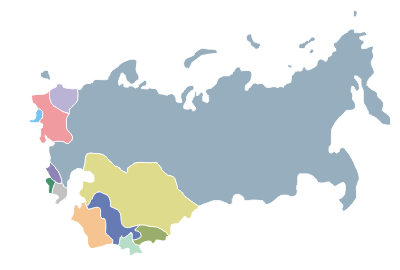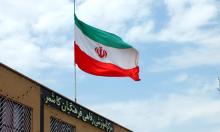Russia to run triumphant international politics in 2006?
In the beginning of 2005 Russia seemed to have lost its influence even on the countries of the former Soviet Union
The year 2005 has been a milestone for Russia as to its relations with the neighbors, the countries of the former Soviet Union, Russia's CIS partners. Given the outcome of the election in Ukraine last December, and the “color” revolution in Kyrgyzstan in March, the start of the year looked rather bleak to Moscow. However, the year has been drawing to a close in a much better way. Moscow has managed to considerably restore its influence on a number of countries of the former Soviet Union. Building a strong levee to hold back the velvet revolutions looming on the CIS horizon was the year's main result. The Kremlin scored a first win in Azerbaijan where the Russian security services are rumored to have helped their Azeri colleagues to uncover a conspiracy against the president. Then the Kazakh President Nursultan Nazarbayev, a much more closer ally of Moscow, won the election and secured his power for the next seven years. 
In the beginning of 2005 Russia seemed to have lost its influence even on the countries of the former Soviet Union. The confrontation with the West, especially with the United States, was escalating. Despite the massive support from Moscow, the pro-Russian presidential candidate has lost. The defeat in Ukraine prompted Russia's liberal opposition figures to speculate about a possibility of “color revolutions” as a wave of public protests against the monetization of benefits was sweeping across the country.
However, the events in Ukraine taught the Kremlin a lesson. While the opposition was seizing power in Bishkek, Russian President Putin made a historic remark regarding the “excess expectations.” “It was wrong to expect any specific achievements on the part of CIS concerning economy, political and military cooperation etc. Achievements were out of the question from the very beginning. Notwithstanding the goals of the organization, which were declared at its inception, the CIS was set up to ensure a smooth breakup of the Soviet Union so that the losses in economic and humanitarian areas could be reduced to a minimum,” said President Putin.
Following the events in Kyrgyzstan, a new course in Russia's foreign policy began to shape up. Two weeks after an officially pro-Moscow Askar Akayev was removed from power, the former opposition made it quite clear that new authorities would pursue even more pro-Russia policies and had no intentions of making a turn towards the United States at the expense of friendship with the closest neighbors and principal business partners. In actuality, the events in Kyrgyzstan can not be called a victory of the Russian foreign policy because Russia was not fighting the West at the time. On the contrary, Russia and the West were working hand in glove. The two sides maintained close cooperation shortly after the toppling of Mr. Akayev when the situation was about to slip out of control and power was up for grabs, speaking of criminals anddrugbarons.
As a result, a certain balance of power between Russia and the West (EU and United States) was established in what used to be the Soviet Union. Judging by the notorious stance of several East European countries including a couple of former Soviet republics on the 60th anniversary festivities of the victory in WWII held in Moscow on May 9, Russia's position proved to be weaker. The leaders of the above countries declared their intentions to set up a new anti-Russian bloc by urging reassessment of the WWII results. In particular, the leaders of Georgia and Azerbaijan did not take part in the Moscow ceremony. The Azeri leadership was apparently getting ready for the parliamentary election; it dreaded U.S. interference in the election campaign, which might result in yet another color revolution. The Ukrainian President Viktor Yushchenko eventually made a last-minute decision of going to Moscow to join the festivities for a few hours.
The above countries actually made up the “anti-Russian Fronde” in the former Soviet Union. Moldavia joined Ukraine and Georgia as parliamentary election in that country was drawing near. The election might have brought about regime change, possibly by force, and therefore the leader of the Communist party Vladimir Voronin opted to cut a deal with the West in order to legitimize the victory of his political force, which allowed him to retain the position of the head of state (in Moldavia the head of state is elected by parliament).
Azerbaijan “broke away” from the Fronde at one stage. In fact, it was the first episode of Moscow's victorious comeback to the republics of the former Soviet Union. Consequently, the ties between Russia and Uzbekistan grew stronger, some of the NATO and US bases were pulled out of Central Asia, the Organization of Agreement on Collective Security and the Shanghai Cooperation Organization began to play a more important pole in the region. However, experts began talking about Azerbaijan opting for the friendship with Russia only after the Azeri president made a number of statements to stress the point that no U.S. troops could be deployed in Azerbaijan. The last doubts were dispelled after the publication of reports on an anti-Aliyev conspiracy foiled by Azeri security services that were rumored to get a helping hand from the Russian intelligence service.
The latest presidential election in Kazakhstan became clear evidence of the invention of an “anti-revolution” vaccine in the CIS. The incumbent president Nursultan Nazarbayev won the election without going through great difficulties or creating big scandals. To complete the restoration of its role as region's leading powerbroker, Moscow should only wait and see Viktor Yanukovich win the upcoming parliamentary election in March next year. In all probability, Mr. Yanukovich would pursue a pro-Russian foreign policy. Mr. Yanukovich's victory would transform 2006 into the year of the CIS, the year of Russia's comeback to the Commonwealth of Independent States.
Subscribe to Pravda.Ru Telegram channel, Facebook, RSS!





